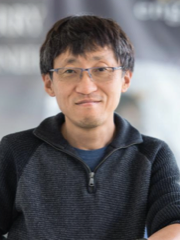Dr. Kim awarded a collaborative grant with his long-time collaborator, Stephen Chan, at UPMC to use single cell RNAseq and advanced network analysis identify anti-inflammatory and anti-fibrotic effects of inhaled treprostinil in patients suffering from pulmonary hypertension (PH) due to interstitial lung disease (ILD). United Therapeutics Corporation, a biotechnology company, is providing financial support for the project through a research grant to the University of Pittsburgh.
Project Title: Single cell RNA sequencing and network analysis to identify anti-inflammatory and anti-fibrotic effects of Tyvaso in WSPH Group 3 pulmonary hypertension
Principal Investigator: Stephen Y. Chan (Primary); Seungchan Kim (PVAMU PI)
See Press release here: scRNAseq-WSPH-Group3

Dr. Seungchan Kim is a Chief Scientist and Executive Professor at the Department of Electrical and Computer Engineering and the Director of the CRI Center for Computational Systems Biology at the Prairie View A&M University (PVAMU). Prior to this appointment, he was the Head of Biocomputing Unit and an Associate Professor at Integrated Cancer Genomics Division of Translational Genomics Research Institute (TGen). He was one of the founding faculty members of TGen, founded in 2002, by Dr. Trent, then-Scientific Director of the National Human Genome Research Institute at the National Institutes of Health, leading computational systems biology research at the institute. He was also an Assistant Professor in the School of Computing, Informatics, Decision Systems Engineering (CIDSE) at the Arizona State University from 2004 till 2011. Dr. Kim received B.S. and M.S. degrees in Agriculture Engineering from the Seoul National University, and Ph.D. in Electrical Engineering from the Texas A&M University. He also got his post-doctoral training at the Cancer Genetics Branch of National Human Genome Research Institute.
Dr. Kim’s research interests include: 1) mathematical modeling of genetic regulatory networks, 2) development of computational methods to analyze multitude of high throughput multi-omics data to identify disease biomarkers, and 3) computational models to diagnose patients or predict patient outcomes, for example, disease subtypes or drug response. His studies have had a large influence on the development of computational tools to study underlying mechanisms for cancer development and better understand the molecular mechanisms behind cancer biology and biological systems.
